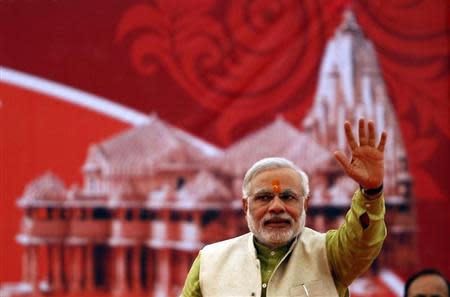
Hindu nationalist Modi waves to his supporters during a public meeting at Somnath
NEW DELHI (Reuters) – The U.S. ambassador to New Delhi is to meet the Hindu nationalist who could be India’s next prime minister, softening Washington’s stance towards a man denied a U.S. visa nearly a decade ago.
Narendra Modi’s Bharatiya Janata Party, or BJP, is considered the favorite to form a government after a general election due by May. He is also the chief minister of Gujarat state, where in 2002, Hindu mobs killed at least 1,000 people, most of them Muslims.
“We can confirm the appointment” with Ambassador Nancy Powell, a U.S. Embassy spokesman said. “This is part of our concentrated outreach to senior political and business leaders … to highlight the U.S.-India relationship.”
India’s Foreign Ministry said the meeting had been fixed for this week.
It will be the highest-profile encounter between U.S. officials and Modi since the U.S. State Department revoked his visa in 2005 over the riots, which erupted after 59 people, mostly Hindu pilgrims, were killed in a fire set on a train.
It was not immediately clear how, if at all, the meeting would affect Modi’s status, or whether the long ban will affect the U.S.-India relationship if he becomes prime minister. Most analysts do not expect the United States to uphold the visa ban if he does become Indian leader.
The two countries are developing closer commercial and strategic ties and share almost $100 billion worth of annual trade, with the United States seeing India as a regional counterweight to China.
But an often volatile relationship has come under strain because of a simmering trade dispute and a recent row over the of an Indian diplomat in New York after she was accused of visa fraud and underpaying her maid.
U.S. State Department spokeswoman Jan Psaki said the meeting did not represent a change in U.S. policy “per se.”
“There has been no change in our long-standing visa policy,” she told a regular news briefing in Washington. “When individuals apply for a visa, their applications are reviewed in accordance with U.S. law and policy. This is not a reflection of any change.”
CONSTRUCTIVE ENGAGEMENT?
U.S. automaker Ford is due to open a plant this year in Gujarat, where Modi has been praised by business leaders for cutting red tape. General Motors already has a production facility there.
Modi’s party is opposed, however, to companies like Wal-Mart opening supermarkets in India.
The change in the U.S. position on Modi is likely to anger members of India’s Muslim community who say Modi allowed or even encouraged attacks on Muslims in the 2002 riots.
Modi has always denied the accusations and a Supreme Court inquiry found no evidence to prosecute him. Maya Kodnani, who served as one of his ministers from 2007 to 2009, was found guilty of murder for her role in the violence.
“Several governments, after the 2002 riots, had decided that they should not engage with Modi. Now that he is a candidate for the prime minister’s job, they believe that they should start discussions with him,” Meenakshi Ganguly, the South Asia director of Human Rights Watch, said in a statement.
“Diplomats should use these meetings to also convey their concerns about the failures to provide justice for the 2002 victims.”
Britain became the first European country to end an informal boycott on meeting Modi, which had been in place since the riots. Other European countries followed suit last year.
The U.S. consul general met Modi two years ago, and Republican lawmakers recently visited Gujarat and invited him to the United States.
VISA ANGER
A senior official at the Gujarat state government’s office in Delhi, which handles requests for official meetings between Modi and foreign diplomats, said the U.S. Embassy had been seeking a meeting for the past two months.
The meeting had not been possible until this week because of Modi’s hectic campaigning schedule plus the dispute over the diplomat, which flared up in December and caused a public outcry in India against Washington, the official said.
“In December, it was difficult, when the atmosphere was so bad,” said the official, who did not want to be named.
Powell will travel to Gujarat’s capital, Gandhinagar, to meet Modi in his office, an aide of Modi told Reuters. It was not clear what would be discussed, but the meeting could happen on Thursday or Friday, the Gujarat official said.
The Hindustan Times newspaper cited a BJP leader as saying the talks would focus on bilateral ties and not Modi’s U.S. visa, which is a sensitive subject among his supporters.
Both sides are working to repair damage done by the row over the arrest and strip-search of an Indian diplomat in New York, which led to the cancellation of high-level visits and the downgrading of privileges for U.S. envoys in India.
Adding another irritant on Monday, the United States said it would take India to the World Trade Organization to gain a bigger foothold for U.S. manufacturers in its fast-growing solar products market.
Opinion polls show Modi’s BJP has the edge in the election race but is unlikely to get a majority and may struggle to win enough seats to form a stable coalition government.





